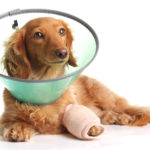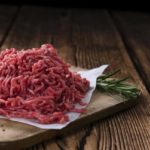
Maintaining your dog’s weight is unbelievably important to raise a healthy and happy dog. At Dig-In we’ve been writing a lot about the common ailments of certain breeds, ways to avoid expensive Vet bills and the importance of nutrition in dogs, as well as how to maintain a healthy gut. This promotes all the goodness that you can imagine: Healthy coat, reduced skin conditions, better breath, even tear stains from the eyes – to name just a few.
With all this research we’ve uncovered a common thread – dogs that are in a healthy weight range stand a MUCH better chance of living healthier, happier, much fuller lives.
With that in mind here are our five great tips to help you keep your pooch, happier and healthier so that you can both enjoy each other’s company for longer!
-
Quality is as important as quantity
Commercial dog food is notorious for bulking up their food with cheap fillers. These fillers are often a cheap source of carbohydrates and meat by-products; wheat and corn by-products, corn gluten meal and low-grade animal by-products. These fillers can be super harmful to your dog as well as being nutritionally void. So even if you’re counting calories on behalf of your pet and you’re feeding them a cheaper option, you’re likely skipping over a lot of essential nutrients. Ensuring your dog’s food bowl has the right quality of ingredients as well quantity will go a long way in keeping their weight correct. In most cases, this means making your own or sourcing a fresh supplier that understands dogs’ needs.
One of the major problems is that all dry and canned dog foods look alike. Even experts cannot tell a good kibble from a bad kibble nutritional by just looking at it. We have to send it to the lab for analysis.
-
What is nutrition for dogs?
Dogs need a specific diet in order to flourish. Just like us, it comes down to balance – the right nutrients in the right amounts. Aside from the trace amounts of minerals and vitamins which are essential, giving your dog the right amount of fat, fibre, protein and carbohydrates is also a huge factor. Despite their robust little digestive tracts, dogs actually have pretty diverse nutritional needs. Their constant companionship throughout human history has left an imprint on the DNA of dietary requirements. It pays to do some research so you can deliver on their requirements. We’ve written a number of articles on this topic and would encourage you to read this one which covers nutritional needs – here.
-
Exercise your dog appropriately
Depending on your breed(s) of dog and size will determine how much exercise they need. For most dogs at least 20-30 minutes is essential. Walking is great for dogs and people, so those at both ends of the leash benefit. Walking also helps your dog to boost their immune function, improve their cardiovascular health and improve behavioural issues like separation anxiety. Bear in mind that some dog breeds will require more than a half-hour walk around the block but all dogs need to get out and about daily.
-
Age is a factor
Like us, dogs start slowing down as they get older. As metabolic rate plays a significant factor in weight gain, their calorie intake should be lessened as they age. This can be tricky as you’ve been routinely feeding your dog for years now and you may not be aware that you have started overfeeding. Your dog will show you that they’re slowing down over time. Some of these ques may include; a slower pace during walks, no more ‘zoomies’, less jumping and of course sleeping more and more. All those little extra efforts used calories for energy so as your dog starts to slow down with age you’ll need to be mindful that you’re feeding them the right amount.
-
Treats count and shouldn’t be junk
Dog treats are a great way to reward your dog for good behaviour but always remember that they contribute to their daily calorie intake. Most dog treats are pretty unhealthy so as a dog owner, you should aim to only use healthy dog treats. If your dog is already overweight then try substituting their favourite toy as a reward.
It’s important to remember that just as weight gain doesn’t happen overnight, neither does weight loss. There are no quick fixes, just consistency and time. You want your dog to live a long and happy life, so focus on making sustainable lifestyle changes which make exercise and healthy food an ordinary part of your dog’s daily routine.
With diet and weight being the most influential factors of your dog’s health, it’s super important to ensure that you are feeding your dog the best food possible. Try using Dig-In Fresh for your dog’s next meal and see the difference.





